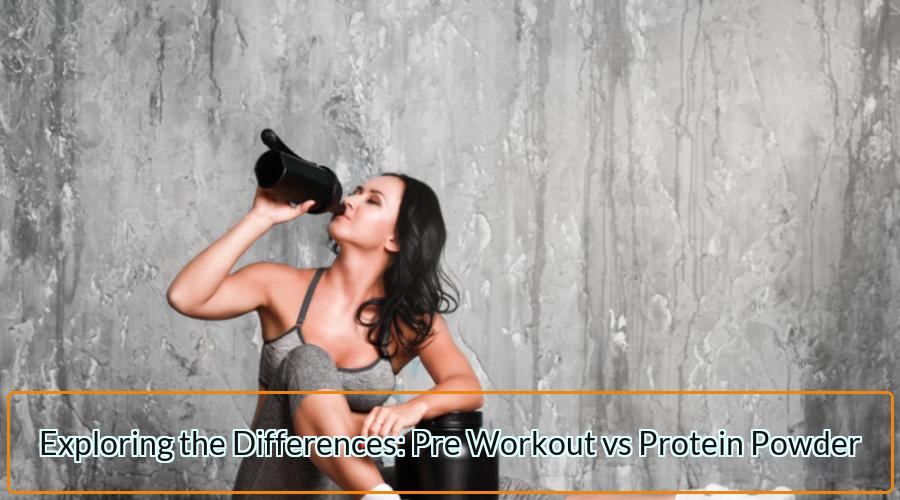
If you’re someone who’s serious about fitness and working out, you’ve probably heard of both pre workout and protein powder supplements. Both of these supplements can be extremely useful in helping you achieve your fitness goals, but they serve different purposes and can have different effects on your body. So, which one should you choose? In this blog post, we’re going to explore the differences between pre workout vs protein powder and help you figure out which one is right for you.
First, let’s start with some background information. Pre workout and protein powder are two of the most popular supplements used by fitness enthusiasts. Pre workout supplements are designed to be taken before a workout to enhance energy, focus, and performance. On the other hand, protein powder is typically consumed after a workout to help with muscle recovery and growth. While both supplements can be beneficial, they have different effects on the body and serve different purposes.
In this post, we’ll be comparing pre workout vs protein powder in terms of their benefits, side effects, and effectiveness. We’ll also discuss the different types of pre workout and protein powder supplements available, as well as factors to consider when choosing the right one for your fitness goals and lifestyle. So, whether you’re a seasoned gym-goer or just starting out on your fitness journey, read on to find out which supplement is right for you.
What are Pre Workout?
Pre workout supplements are dietary supplements designed to be taken before a workout to enhance energy, focus, and performance. These supplements typically contain a blend of ingredients that work together to increase blood flow, reduce fatigue, and improve mental clarity, among other benefits. Pre workout supplements are commonly used by athletes, bodybuilders, and fitness enthusiasts to improve their workouts and achieve better results. Some of the key ingredients found in pre workout supplements include caffeine, beta-alanine, creatine, and amino acids, among others.
What are Protein Powder?
Protein powder is a dietary supplement that is commonly used by athletes, bodybuilders, and fitness enthusiasts to help meet their protein needs and support muscle recovery and growth. Protein powder is typically made from whey, casein, or plant-based sources such as soy, pea, or rice protein. It comes in a powder form that can be mixed with water or milk to make a shake, or added to food such as oatmeal or yogurt. Protein powder supplements are a convenient way to increase protein intake and support muscle recovery and growth, particularly after exercise. They are also used by people who follow vegetarian or vegan diets, or those who have difficulty meeting their protein needs through food alone.
Read more about Narrow Smith Machine Squats
Benefits of Pre Workout vs Protein Powder
Pre Workout Benefits
Pre workout supplements are designed to provide a range of benefits to help improve workout performance. Here are some of the key benefits of pre workout supplements:
- Increased energy and focus: Pre workout supplements often contain caffeine and other stimulants that can help increase energy levels and improve mental focus. This can be especially useful for early morning or late evening workouts when you may be feeling tired or sluggish.
- Improved performance: Pre workout supplements may also contain ingredients that can help improve physical performance, such as beta-alanine and creatine. These ingredients can help increase muscle strength and endurance, allowing you to work out for longer and at a higher intensity.
- Increased endurance: Some pre workout supplements contain ingredients like nitric oxide boosters that can help increase blood flow and oxygen delivery to the muscles. This can help improve endurance and delay the onset of fatigue during exercise.
While pre workout supplements can be very effective at improving workout performance, it’s important to note that they may not be suitable for everyone. Some people may be sensitive to the ingredients in pre workout supplements and may experience side effects like nausea, jitters, or insomnia.
Protein Powder Benefits
Protein powder is a popular supplement used to support muscle recovery and growth. Here are some of the key benefits of protein powder:
- Muscle recovery and growth: Protein powder is a convenient way to increase your protein intake, which is important for muscle recovery and growth. After a workout, your muscles need protein to repair and rebuild themselves, and consuming protein powder can help provide the necessary building blocks.
- Satiety and weight management: Protein is also a very satiating nutrient, which means it can help keep you feeling full and satisfied after a meal. This can be particularly useful for people who are trying to lose weight or maintain a healthy weight.
- Improved bone health: Some studies have also suggested that consuming protein can help improve bone health by increasing bone mineral density and reducing the risk of fractures.
It’s important to note that protein powder supplements should not be used as a replacement for whole foods that are rich in protein, such as meat, fish, eggs, and legumes. Rather, they should be used as a supplement to help meet your protein needs when whole foods are not available or convenient. Additionally, it’s important to choose a high-quality protein powder that is free of additives and contaminants.
Side Effects of Pre Workout vs Protein Powder
Pre Workout Side Effects
While pre workout supplements can be very effective at improving workout performance, they can also come with a range of side effects. Here are some of the most common side effects of pre workout supplements:
- Nausea and vomiting: Pre workout supplements often contain ingredients like caffeine and beta-alanine that can cause gastrointestinal distress, such as nausea and vomiting.
- Increased heart rate and blood pressure: Some pre workout supplements contain high levels of caffeine, which can cause an increase in heart rate and blood pressure. This can be particularly dangerous for people with pre-existing heart conditions.
- Insomnia and anxiety: The stimulants found in pre workout supplements can also cause insomnia and anxiety in some people, particularly if taken later in the day.
- Dehydration: Pre workout supplements can also cause dehydration, particularly if they contain diuretic ingredients like caffeine or dandelion root.
It’s important to note that the severity of these side effects can vary depending on the individual and the specific pre workout supplement being used. It’s also important to follow the recommended dosage and avoid taking multiple supplements that contain similar ingredients.
Protein Powder Side Effects
While protein powder is generally considered safe for most people, it can still cause side effects in some cases. Here are some of the most common side effects of protein powder:
- Digestive issues: Some people may experience digestive issues like bloating, gas, or diarrhea when consuming protein powder. This is usually due to the lactose or other additives found in some protein powders.
- Kidney damage: There has been some concern that consuming high levels of protein, including protein powder, can lead to kidney damage in some people. However, this is generally only a concern for people with pre-existing kidney problems.
- Heavy metal contamination: Some protein powders have been found to be contaminated with heavy metals like arsenic, lead, and cadmium. This is more common in plant-based protein powders, as plants can absorb heavy metals from the soil.
Read more about Deadlift Breathing

Types of Each Supplement
Pre Workout Supplements
There are several different types of pre workout supplements available, each with its own unique benefits and drawbacks. Here are some of the most common types of pre workout supplements:
- Stimulant-based: Stimulant-based pre workout supplements contain ingredients like caffeine and ephedrine that help increase energy and mental focus. While these supplements can be very effective, they can also cause side effects like jitters, anxiety, and insomnia.
- Non-stimulant-based: Non-stimulant-based pre workout supplements contain ingredients like beta-alanine, creatine, and nitric oxide boosters that help improve physical performance without causing the same side effects as stimulant-based supplements.
- Natural or homemade options: Some people prefer to use natural or homemade pre workout supplements, such as green tea, beetroot juice, or even coffee. While these options may not be as potent as commercial pre workout supplements, they can still provide some benefits and may be a good option for people who are sensitive to the ingredients in traditional pre workout supplements.
When choosing a pre workout supplement, it’s important to consider your personal preferences, fitness goals, and any pre-existing health conditions. It’s also important to choose a supplement that is safe and effective, and to follow the recommended dosage.
Protein Powder Supplements
There are several different types of protein powder supplements available, each with its own unique properties and benefits. Here are some of the most common types of protein powder supplements:
- Whey protein: Whey protein is one of the most popular types of protein powder supplements. It is derived from milk and contains all of the essential amino acids needed for muscle recovery and growth. Whey protein is also rapidly absorbed by the body, making it an ideal post-workout supplement.
- Casein protein: Casein protein is another type of protein powder derived from milk. Unlike whey protein, which is rapidly absorbed, casein protein is slowly absorbed by the body, providing a steady supply of amino acids over several hours. This makes it a good option for people who want to promote muscle recovery and growth throughout the day and night.
- Plant-based protein: Plant-based protein powders are becoming increasingly popular, particularly among people who follow vegetarian or vegan diets. These powders are typically made from sources like soy, pea, or rice protein and can provide all of the essential amino acids needed for muscle recovery and growth. While they may not be as potent as animal-based protein powders, they can still be an effective way to meet your protein needs.
When choosing a protein powder supplement, it’s important to consider your personal preferences, dietary restrictions, and any pre-existing health conditions. It’s also important to choose a high-quality supplement that is free of additives and contaminants.

Factors to Consider When Choosing Pre Workout vs Protein Powder
When choosing between pre workout and protein powder supplements, there are several factors to consider. Here are some of the most important factors to keep in mind:
- Fitness goals: Your fitness goals will play a big role in determining whether you should use a pre workout or protein powder supplement, or both. If you’re looking to improve workout performance, boost energy levels, and increase endurance, a pre workout supplement may be more appropriate. If you’re looking to support muscle recovery and growth, increase protein intake, and improve body composition, a protein powder supplement may be more appropriate.
- Personal preferences: Your personal preferences will also play a role in determining which supplement to use. For example, if you’re sensitive to caffeine or other stimulants, a pre workout supplement may not be a good fit for you. If you’re a vegetarian or vegan, a plant-based protein powder may be a better choice.
- Health and medical conditions: If you have any pre-existing health conditions or take any medications, it’s important to speak with a healthcare provider before using any dietary supplement. Certain ingredients in pre workout or protein powder supplements may interact with medications or exacerbate certain health conditions.
- Cost and accessibility: Cost and accessibility are also important factors to consider. Pre workout supplements can be more expensive than protein powders, and certain types of protein powders may be more expensive than others. Additionally, some supplements may be harder to find or may not be available in your area.
Ultimately, the best supplement for you will depend on your individual needs and preferences. It’s important to do your research, choose a high-quality supplement, and follow the recommended dosage to maximize the benefits and minimize the risk of side effects.
Conclusion
Choosing between pre workout and protein powder supplements can be a difficult decision, but understanding the benefits, side effects, and types of supplements available can help you make an informed choice. Pre workout supplements can provide a range of benefits, including increased energy and focus, improved performance, and increased endurance. However, they can also come with side effects like nausea, increased heart rate, and insomnia. Protein powder supplements, on the other hand, can support muscle recovery and growth, increase protein intake, and improve body composition. However, they can also cause digestive issues or heavy metal contamination.
When choosing between pre workout and protein powder supplements, it’s important to consider your fitness goals, personal preferences, health and medical conditions, and cost and accessibility. Ultimately, the best supplement for you will depend on your individual needs and preferences. By doing your research, choosing a high-quality supplement, and following the recommended dosage, you can maximize the benefits and minimize the risk of side effects.